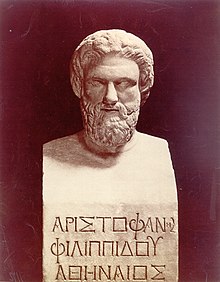อาริสโตพาแนส
อาริสโตพาแนส | |
|---|---|
| Ἀριστοφάνης | |
 รูปปั้นครึ่งตัวของอริสโตฟาเนส | |
| เกิด | ราว 446 ก่อนคริสตกาล เอเธนส์ |
| เสียชีวิต | c. 386 ก่อนคริสตกาล เดลฟี |
| อาชีพ | นักประพันธ์บทละคร (สุขนาฏกรรม) |
| ปีปฏิบัติงาน | 427 ก่อนค.ศ. – 386 ก่อนค.ศ. |
| มีชื่อเสียงจาก | นักประพันธ์ Old Comedy |
| ผลงานเด่น |
|
| หมายเหตุ | |
† Although many artists' renderings of Aristophanes portray him with flowing curly hair, several jests in his plays indicate that he may have been prematurely bald.[1] | |
อาริสโตพาแนส (กรีกโบราณ: Ἀριστοφάνης, [a.ris.to.pʰá.nɛːs]; c. 446 – c. 386 ก่อนคริสตกาล) หรือ อริสโตฟานีส (อังกฤษ: Aristophanes) เป็นนักประพันธ์บทละครชวนหัว (สุขนาฏกรรม) สมัยกรีซยุคคลาสสิค มีชีวิตอยู่ราวช่วงปีที่ 446-386 ก่อนคริสตกาล อาริสโตพาแนสประพันธ์บทละครไว้ทั้งสิ้น 40 เรื่อง แต่ตกทอดมาถึงปัจจุบันโดนสมบูรณ์เพียง 11 เรื่อง นอกนั้นเป็นเพียงชิ้นส่วนพาไพรัสที่ส่วนใหญ่ขาดหายไป งานของอาริสโตพาแนสเหล่านี้เป็นตัวอย่างเท่าที่เรามีเกี่ยวกับประเภทของงานสุขนาฏกรรมที่เรียกว่า Old Comedy[2] ท่านได้รับฉายาว่าเป็น "บิดาแห่งสุขนาฏกรรม"[3]
กล่าวกันว่างานของอาริสโตพาแนสให้ข้อมูลเกี่ยวกับเอเธนส์โบราณได้น่าเชื่อถือยิ่งกว่านักเขียนคนใดๆ[4] ความสามารถของเขาในการเยาะเย้ยถากถาง เป็นที่ยำเกรงและรับทราบกันในผู้มีอิทธิพลร่วมสมัย เพลโตชี้ลงไปว่าบทละครเรื่อง เมฆ (The Clouds) เป็นการหมิ่นประมาทโดยการโฆษณาที่ทำให้โสเครตีสต้องถูกพิจารณาคดี และถูกตัดสินลงโทษประหารชีวิต[5][6] แม้ว่าจะมีงานเสียดสีล้อเลียนตัวโสเครตีส จากนักประพันธ์เชิงเสียดสี (satirical) รายอื่นก็ตาม[7]
อาริสโตพาแนสมีชีวิตผ่านช่วงเวลาที่เอเธนส์ประสบวิกฤติทางการเมืองอย่างต่อเนื่อง ทั้งหายนะจากสงครามเพโลพอนนีเซียน (ซึ่งเอเธนส์เป็นฝ่ายแพ้) การปฏิวัติของกลุ่มคณาธิปไตยสองครั้ง และการกู้คืนระบอบประชาธิปไตยสองครั้ง โสเครตีสถูกพิพากษาในข้อหาอาชญากรรมทางความคิด และยูริพิดีสต้องเนรเทศตัวเองไปตายที่เมืองอื่น ด้วยเหตุนี้จึงมีผู้เชื่อว่าแม้งานของอาริสโตพาแนสจะแดกดันหรือเสียดสีเรื่องการเมืองอยู่เป็นนิตย์ แต่ตัวท่านนักประพันธ์เองคงจะไม่ได้มีส่วนเกี่ยวข้องในทางการเมืองมากนัก[8]
เมื่อเปรียบเทียบกับนาฏศิลปินโศกนาฏกรรมอย่าง ซอโฟคลีส และยูริพิดีสแล้ว อาริสโตพาแนสมีส่วนช่วยพัฒนาศิลปะการละครในยุคต่อไปมากกว่า ทั้งนี้เพราะซอโฟคลีส กับยูริพิดีส ถึงแก่กรรมลงในช่วงปลายสงครามเพโลพอนนีเซียน ทำให้ศิลปะของละครโศกนาฏกรรมหยุดพัฒนาไปเสีย แต่การละครสุขนาฏกรรมยังมีการวิวัฒนาการต่อมาเรื่อยๆ แม้หลังเอเธนส์จะพ่ายแพ้สงคราม ซึ่งสาเหตุหนึ่งเป็นเพราะการที่ปรมาจารย์ละครชวนหัวอย่างอาริสโตพาแนสยังมีชีวิตอยู่ต่อมานานพอที่จะช่วยศิลปินรุ่นหลังพัฒนาต่อยอดศิลปะแขนงนี้[9]

อ้างอิง
- ↑ Barrett (1964) p. 9
- ↑ Aristophanes: Clouds K. J. Dover (ed), Oxford University Press 1970, Intro. p. X.
- ↑ Aristophanes in Performance 421 BC – AD 2007: Peace, Birds and Frogs Edith Hall and Amanda Wrigley, Legenda (Oxford) 2007, p. 1
- ↑ Barrett (2003), p. 26
- ↑ The Apology translated by Benjamin Jowett, section 4
- ↑ Apology, Greek text, edited J. Burnet, section 19c
- ↑ Sommerstein, Alan. (ed.) Lysistrata, The Acharnians, The Clouds. Penguin Books 1973, p. 16
- ↑ Aristophanes: Clouds K. J. Dover (ed), Oxford University Press 1970, Introduction p. IX
- ↑ "Greek Drama" Peter Levi, in The Oxford History of the Classical World J. Boardman, J. Griffin and O. Murray (eds), Oxford University Press 1986, p. 176
บรรณานุกรม
- Andrewes, Antony (1981). Greek Society. Pelican Books.
- Aristophanes (1970). K. J. Dover (บ.ก.). The Clouds. Oxford University Press.
- Aristophanes (1906). Aristophanis Comoediae Tomus 1. Oxford University Press.
{cite book}: ไม่รู้จักพารามิเตอร์|editors=ถูกละเว้น แนะนำ (|editor=) (help) - Barrett, David (1964). The Frogs and Other Plays. Penguin Books.
- {cite book|last=Barrett|first= David|year=2003|title= The Birds and Other plays|publisher= Penguin Books}
- Hall, Edith & Wrigley, Amanda (2007). Aristophanes in Performance 421 BC – AD 2007: Peace, Birds and Frogs. Legenda (Oxford).
- Handley, E. (1985). "Comedy". The Cambridge History of Classical Literature: Greek Literature. Cambridge University Press.
{cite book}: ไม่รู้จักพารามิเตอร์|editors=ถูกละเว้น แนะนำ (|editor=) (help) - Irvine, Andrew David (2008). Socrates on Trial: A play based on Aristophanes' Clouds and Plato's Apology, Crito, and Phaedo, adapted for modern performance. Toronto: University of Toronto Press.
- Kassel, Rudolf & Austin, Colin (1984). Poetae Comici Graeci. Vol. III.2. De Gruyter (Berlin).
- Konstan, David (1995). Greek Comedy and Ideology. Oxford university Press US.
- Lamb, W. R. M. (1975). Plato. Vol. 3. Loeb Classical Library.
- Levi, P. (1986). "Greek Drama". The Oxford History of the Classical World. Oxford University Press.
{cite book}: ไม่รู้จักพารามิเตอร์|editors=ถูกละเว้น แนะนำ (|editor=) (help) - MacDowell, Douglas (1971)(1978) Aristophanes Wasps, Oxford University Press, n.32
- Parker, L. P. E. (1997). The Songs of Aristophanes. Oxford University Press.
- Reckford, Kenneth J. (1987). Aristophanes' Old-and-new Comedy. UNC Press.
- Rennie, W. (1909). The Acharnians of Aristophanes. Edward Arnold (reproduced by Bibliolife).
- Rosen, Ralph (1999). "Introduction". Aristophanes. Vol. 3. University of Pennsylvania Press (Penn Greek Drama Series).
- Silk, M. S. (2002). Aristophanes and the Definition of Comedy. Oxford University Press.
- Somerstein, Alan (1973). Aristophanes: Lysistrata, The Acharnians, The Clouds. Penguin Books.
- Storey, Ian (1998). "Introduction". Clouds, Wasps, Birds By Aristophanes. translation by Peter Meineck. Hackett Publishing.
- Van Steen, Gonda (2007). "Politics and Aristophanes: watchword Caution!". The Cambridge Companion to Greek and Roman Theatre. Cambridge University Press.
{cite book}: ไม่รู้จักพารามิเตอร์|editors=ถูกละเว้น แนะนำ (|editor=) (help) - Welsh, D. (1983). "IG ii2 2343, Philonides and Aristophanes' Banqueters". Classical Quarterly. Vol. 33.
- David, Ephraim (1984). Aristophanes and Athenian Society of the Early Fourth Century B.C. Leiden, Netherlands: Brill.
- Edwards, Anthony T. (1991). "Aristophanes' comic poetics". Transactions of the American Philological Association. 121: 157–79.
- Jeffrey Henderson, Professor of Classics at University of Southern California (1991). The Maculate Muse: Obscene Language in Attic Comedy. Oxford University Press. ISBN 978-0-19-536199-5.
- reviewed by W. J. Slater, Phoenix, Vol. 30, No. 3 (Autumn, 1976), pp. 291–293 doi:10.2307/1087300
- Loscalzo, Donato (2010). Aristofane e la coscienza felice. ISBN 978-88-6274-245-0.
- Aristophanes and the Comic Hero by Cedric H. Whitman Author(s) of Review: H. Lloyd Stow The American Journal of Philology, Vol. 87, No. 1 (Jan., 1966), pp. 111–113
- MacDowell, Douglas M. (1995). Aristophanes and Athens: An Introduction to the Plays. Oxford and New York: Oxford University Press. ISBN 9780198721598.
- Murray, Gilbert (1933). Aristophanes: A Study. Oxford and New York: Oxford University Press.
- Platter, Charles (2006). Aristophanes and the Carnival of Genres. JHUP. ISBN 978-0-8018-8527-3.
- G. M. Sifakis The Structure of Aristophanic Comedy The Journal of Hellenic Studies, Vol. 112, 1992 (1992), pp. 123–142 doi:10.2307/632156
- Taaffe, L. K. (1993). Aristophanes and Women. London and New York: Routledge.
- Ussher, Robert Glenn (1979). Aristophanes. Oxford: Clarendon Press.
- Van Steen, Gonda. 2000 Venom in Verse: Aristophanes in Modern Greece. Princeton University Press.
- Jstor.org, The American Journal of Philology, 1996.
- Life, death and Aristophanes' concept of Eros in Saul Bellow's "Ravelstein".